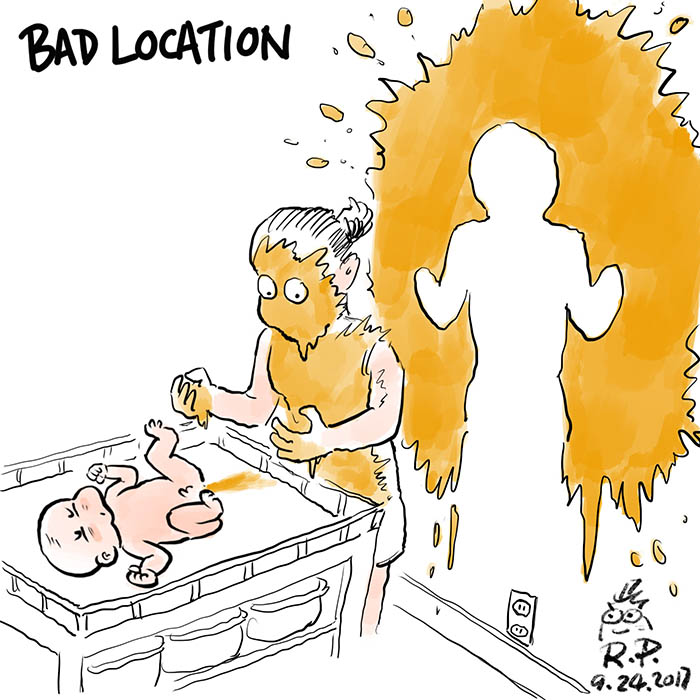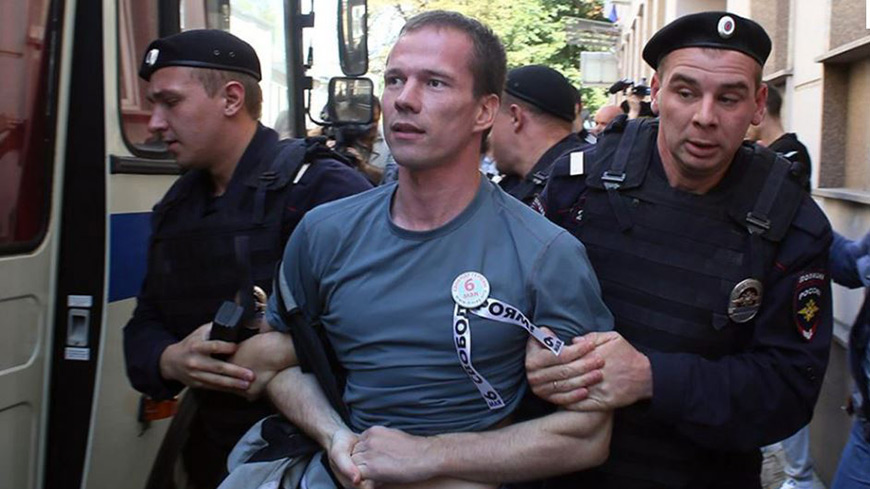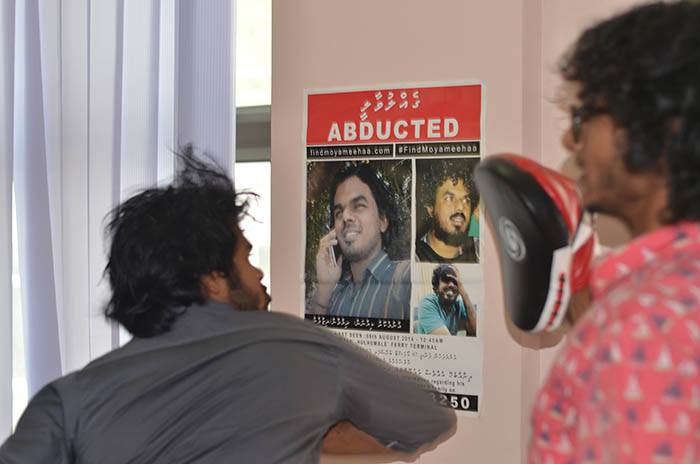Index relies entirely on the support of donors and readers to do its work.
Help us keep amplifying censored voices today.
[vc_row][vc_column][vc_column_text]

From left: Cartoonist Martin Rowson accepting the Arts Award on behalf of Chinese cartoonist Rebel Pepper; Alp Toker of Digital Activism Award-winner Turkey Blocks; Isik Mater of Digital Activism Award-winner Turkey Blocks; Anastasia Zotova, wife and campaign partner of Campaigning Award-winner Ildar Dadin; Ahmed Naish, deputy editor of Journalism Award-winning Maldives Independent; Zaheena Rasheed, former editor of Journalism Award-winning Maldives Independent. (Photo: Elina Kansikas for Index on Censorship)
Since the Index on Censorship Awards, the 2017 fellows have been busy doing important work in their respective fields to further their cause and for stronger freedom of expression around the world.

Baby Pepper
Rebel Pepper, the Chinese cartoonist critical of the country’s government, now lives in exile in the USA where he works for Radio Free Asia. “Everything is going well, and I have a lot of friendly colleagues who like my work,” he told Index on Censorship.
He also continues to write his column in the Japanese version of Newsweek and worries about many recent developments in his home country. “The CCP’s control of society is becoming more and more severe, people are exposed to less and less real news from the outside world, and vice versa,” he says. “It’s hard to sum up because there are so many problems right now.”
The artist is still getting cartoons published and says the Index on Censorship award gave him the energy to “keep walking on the creative road”.
There is a new addition to the Rebel Pepper family, with baby Kitano. “Every day I have to change a lot of diapers, which has had a big influence on my sleeping patterns, so I have to find some fun from him,” Rebel Pepper tells Index, brandishing a cartoon to illustrate his point.

Campaigning fellow Ildar Dadin has returned to activism since his release from prison in February. “Along with friends or on single pickets, we are openly showing that we aren’t in agreement with what’s happening in the country,” Dadin tells Index.
Last month he was detained in St Petersburg while trying to film a woman being assaulted by police. “The situation in this country now is really bad,” Dadin says. “There’s a new kind of police force which can attack and humiliate people, which is very serious.”

He describes the arrests of more than 260 people during anti-Putin protests across Russia — including St Petersburg — in October as “pretty much normal for any activist in the country”.
Dadin believes that pressure from civil society both in Russia and abroad were partially responsible for his release. He hopes for “justice for all people, not just Russians”.
Moving forward, Index is helping Dadin with his transition to life outside of prison and prioritising his health and also helping him to gain additional international exposure.
“We are now going to be the NetBlocks project and expand our work,” director of research at Turkey Blocks Isik Mater tells Index. The team are taking steps to formalise some of their tools and methodologies, expand into new regions that have similar needs and now cover several countries experimentally.
The Turkey Blocks team have also developed a new tool called Cost, which calculates the financial impact of mass-censorship. “Governments don’t tend to care about the human rights argument, so they don’t listen to it,” says Alp Toker, founder of Turkey Blocks. “But if you tell them ‘this will cost x million dollars of harm to GDP’ then they perk up because that can become a political issue, which is a very powerful method of convincing governments not to censor content.”
Turkey, however, has been quite quiet recently in terms of internet shutdowns, after a barrage of such incidents in the year following the attempted coup in July 2016. In fact, the Turkish government have been using Turkey Blocks data on internet shutdowns as a kind of audit, Toker explains. “We ran our first panel with the Turkish government just a few weeks ago, which is kind of historic,” he says. “We are seeing really positive things, and although they have a long way to go it should be noted that they’ve been willing to have a dialogue with civil society and with a human rights group.”
Index on Censorship is helping Turkey Blocks through the process of forming a board and incorporating public speaking training skills for Mater so that she too can begin to make more public appearances.

Staff at the Maldives Independent taking part in self-defence training.
Journalism fellows at Maldives Independent are going through a period of change. Former editor Zaheena Rasheed left the publication soon after awards week in London to take up a position on the online team at Al Jazeera, where she has recently been doing a lot of work covering the Rohingya refugee crisis from Bangladesh.
For personal reasons, Rasheed finds it difficult to be involved with the Maldives on top of this. “A friend of ours in the Maldives, Yameen Rasheed, was murdered at the end of the Index awards week in London and that was a big blow — it was very hard for me.”
Yameen Rasheed was a prominent blogger and internet activist who died from multiple stab wounds after an attack in the stairway of his apartment building in Malé on Sunday 23 April 2017. Index on Censorship has been involved in helping the Maldives Independent better secure their personal and office safety since Yameen Rasheed’s murder, including a recent self-defence training session.
A new editor took over at the Maldives Independent in mid-September and since then the publication has seen a noticeable spike in readership, and reporters are encouraged to get out and meet people, build relationships and contacts.
“It’s fairly calm at the moment — there have been no coups, for example — so I see this period as a time to hone the team’s reporting and feature writing skills,” a staff member tells Index. “We’re doing a broad mix of news and features: politics, tourism, mental health, rave culture, the hipster coffee scene, rural development, sex abuse cover-ups.”
Staff at the Maldives Independent hope that the publication continues to be a forum for debate and free speech, that it holds power to account, exposes wrongdoing and corruption and most of all give insight into a country that many people have only one image of.
[/vc_column_text][/vc_column][/vc_row][vc_row][vc_column][vc_basic_grid post_type=”post” max_items=”4″ element_width=”6″ grid_id=”vc_gid:1510228913303-fd0d57c2-b760-1″][/vc_column][/vc_row]
[vc_row][vc_column][vc_single_image image=”89552″ img_size=”full” add_caption=”yes” alignment=”center”][vc_separator color=”black”][vc_column_text]Following the Index on Censorship Freedom of Expression Awards in April, journalism award-winner Maldives Independent has undergone a period of change and restructuring.
Former editor Zaheena Rasheed credits the award with increased press coverage outside of the Maldives. Most significantly, Rasheed told Index that the attention from the award convinced their sponsors to continue funding them.
After an Al Jazeera documentary containing interviews with Rasheed was released, the Maldives Independent’s office was attacked and raided by police in September 2016 and Rasheed had to flee for her safety. She has since taken a role at Al Jazeera in Doha, Qatar.
“The job has been very busy, but exciting, especially following a diplomatic crisis between Qatar and its neighbours,” Rasheed told Index.
In late April, Yameen Rasheed, a prominent blogger and journalist, who had contributed opinion pieces in the Maldives Independent, was murdered. His death is still on the minds of those at Maldives Independent, which extensively covered the investigation into his murder.
“Yameen was a critical and brave voice who spoke out against injustice despite the crackdown on free speech. His murder has had a chilling effect on free speech in the Maldives and prompted many others to practice self-censorship. I believe he was targeted by religious extremists because of his advocacy for a more tolerant and secular society”, Rasheed said. No information has been released on the identities of the suspects in Rasheed’s murder or what charges they might face.
Maldives Independent journalist Ahmed Rilwan disappeared in August 2014. Despite the international attention these incidents have received, Rasheed is not confident that they will affect the culture of impunity that exists around attacks on critics and freethinkers.
“The biggest concern, as evident by Yameen’s murder and Rilwan’s disappearance, is that there are groups who are willing to kill in the name of Islam. They enjoy impunity because they have the protection of state bodies. State officials support them for two reasons; they think supporting radical groups bolsters their legitimacy, or they also subscribe to these views” Rasheed said.
Rasheed identifies the Maldives Independent’s biggest challenge is securing consistent and sufficient funding, something which Maldives Independent is working on now. [/vc_column_text][/vc_column][/vc_row][vc_row][vc_column][vc_basic_grid post_type=”post” max_items=”12″ style=”load-more” items_per_page=”4″ element_width=”6″ grid_id=”vc_gid:1509444026808-19a50408-3e9b-3″ taxonomies=”9028, 4002, 9136″][/vc_column][/vc_row]
When satirical blogger Yameen Rasheed was brutally murdered in the stairwell of his apartment block on 23 April, it brought home a regrettable reality for fellow Maldivian journalist Zaheena Rasheed (no relation): Paranoia can be paralysing, but journalists in the Maldives “should never let their guards down”. Read the full article
[vc_row][vc_column][vc_single_image image=”89549″ img_size=”full” add_caption=”yes”][vc_column_text]After five years the president of the Maldives may be on his way out — but no one is celebrating yet.
The Indian Ocean island nation voted on Sept. 23, 2018 to oust sitting president Abdulla Yameen in favor of challenger Ibrahim Mohamed Solih, who won 58 percent of the vote. The message? They were done with Yameen’s increasingly authoritarian rule.
Yameen came into power in 2013 and has jailed or forced many of his political opponents into exile. He’s restricted protests and reduced media freedom, all while boosting corruption in the government with bribes, embezzlement and human rights abuses.
The Maldives Independent, winner of the 2017 Index on Censorship Freedom of Expression Journalism Award, is one of the few independent news organisations left in the country. In 2014, Maldives Independent journalist Ahmed Rilwan, known for criticising the government, went missing. He has still not been found. Many believe Yameen’s hand played a role in his disappearance and the subsequent lack of investigation.
Two years later, Yameen signed a criminal defamation law that created fines and jail sentences for slander or defamatory speech, speech threatening “social norms” or national security, and remarks against Islam. The law was criticised by the United Nations and the United States, both calling it a move against freedom of expression.
Yameen’s biggest accomplishments have been in development, building an extension to a public hospital in the capital, new airports, and the country’s first overwater bridge. But behind these projects was even more corruption, critics say.
In 2016, Al Jazeera exposed a major scandal in which Yameen and then vice-president Ahmed Adeeb leased islands to tourism companies and embezzled the money for themselves. Zaheena Rasheed, then editor-in-chief of the Maldives Independent, appeared in Al Jazeera’s investigative documentary. Hours after the documentary went online, police raided the news organisation’s offices. Rasheed has since fled the country.
Addressing the embezzlement at a debate a week before the election, Yameen pointed his finger at the former vice president and “the system” as the cause behind the corruption, denying any wrongdoing.
With a platform based on restoring democracy and freeing Yameen’s political prisoners, Solih represents a new leaf for the nation.
Riazat Butt, current editor of the Maldives Independent, called the two candidates “night and day.” And though Solih may want to make significant changes in the government, Butt said three out of four of the parties in the coalition backing Solih have shown little interest in democracy.
“The opposition alliance has not said what will happen if the coalition falls apart,” Butt said. “There is an agreement they have to sign about steps to be taken in such an event, but the agreement has not been made public and the president-elect’s spokeswoman is refusing to answer questions on it.”
On top of the issues Solih may face within his coalition, Yameen is not going down without a fight.
The leader of Yameen’s party, the Progressive Party of the Maldives, launched an investigation into complaints regarding the authenticity of the ballots cast, citing “systematic irregularities.” The party has asked the Elections Commission to delay publishing the final results and has reportedly told their supporters to submit electoral complaints to the commission.
The move has been denounced by the opposition party and the Human Rights Watch, who say it is an attempt to annul the election.
“Yameen has too much to lose to just step aside,” Butt said. “He may find a non-violent way to steal the election after all….he just needs to do it in a way that avoids sanctions and military action against him.”
On Oct. 10, Yameen challenged the election results in the Supreme Court. If the Court finds proof of irregularities, the election could be annulled.
Meanwhile, members of the Elections Commission have received anonymous threats due to their dismissal of the ruling party’s claims of fraud.
If Solih is able to secure the presidency and move his coalition government into power, it may not result in much change regarding journalism in the country. Butts called the coalition manifesto “fantastically vague” about press freedom. Though journalists have asked for specifics, like if the anti-defamation law will be repealed or if background checks for foreign journalists will end, they have not received answers.
“There is no detail, and that’s not good enough,” she said. “I honestly think it is too soon for anyone to relax or believe that their job will become easier or safer.”
[/vc_column_text][/vc_column][/vc_row][vc_row][vc_column][vc_basic_grid post_type=”post” max_items=”4″ element_width=”6″ grid_id=”vc_gid:1539606582611-fd540886-18b2-7″ taxonomies=”9028″][/vc_column][/vc_row]